If you are selecting a name, Japanese culture offers profound and unique meanings.
Names are not just words; they carry stories, symbolism, and in some cases, a darker, mysterious allure.
If you’re intrigued by the mystique of Japanese names that mean “death” or are associated with its themes, you’re in the right place.
If you’re creating a character, naming a pet, or simply exploring, this list is a treasure trove of inspiration.
In this article, we’ll dive deep into Japanese names related to death, their meanings, and their usage. Ready to explore the beauty of these names? Let’s jump in!
What Makes Japanese Names Special?
Japanese names are renowned for their deep meanings, often tied to nature, emotions, or philosophies. Each name has a kanji (Chinese character) that contributes to its meaning. This makes Japanese names flexible and poetic.
Why Explore Names That Mean Death?
Names related to death hold a special allure due to their connection with mystery, transformation, and life cycles. Whether you’re looking for a name with an edge, a sense of depth, or symbolic meaning, death-themed names can offer a unique touch.
Japanese Names That Mean Death (General)
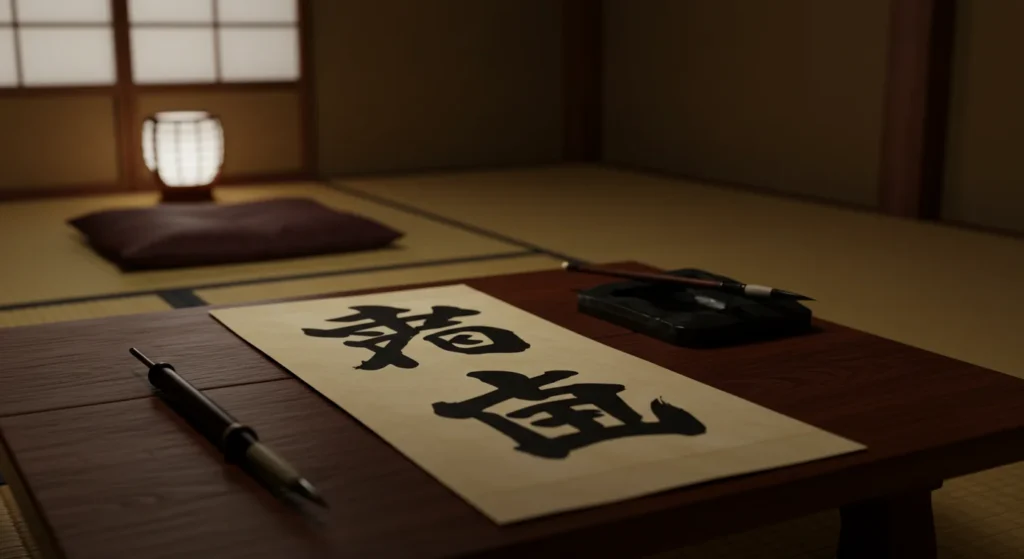
Here are some names that explicitly or symbolically mean “death” in Japanese:
- Shinigami (死神): A god or spirit of death.
- Shi (死): The direct term for death.
- Ankou (暗行): Associated with the figure of death in folklore.
- Kurai (暗い): Means dark or gloomy, often tied to death symbolism.
- Kage (影): Shadow, representing the otherworldly.
- Shisha (死者) – Means “deceased person” or “the dead.”
- Shikabane (屍) – Means “corpse” or “remains of the dead.”
- Meifu (冥府) – The underworld or the realm of the dead.
- Yomi (黄泉) – The land of the dead in Japanese mythology.
- Shi no Kami (死の神) – “God of Death,” similar to Shinigami.
- Shin’en (深淵) – Means “abyss” or “deep darkness,” often symbolic of death.
- Kuragari (暗がり) – Means “darkness” or “gloom,” symbolizing death.
- Bōrei (亡霊) – A vengeful or restless spirit of the dead.
- Onryō (怨霊) – A ghost that seeks revenge, associated with violent deaths.
- Yūrei (幽霊) – A generic term for ghosts or spirits of the dead.
- Shikyo (死境) – Means “verge of death” or “dying moment.”
- Kyomu (虚無) – Means “nothingness” or “void,” symbolizing the afterlife.
- Mu (無) – Meaning “nothingness” or “emptiness,” associated with death.
- Mugen (無限) – Means “infinity,” sometimes tied to eternal rest or death.
- Goryō (御霊) – Spirits of noble individuals who died tragically.
- Sōgi (葬儀) – Means “funeral,” associated with death rituals.
- Hakumei (薄命) – Means “short-lived” or “fragile life.”
- Zanshi (残死) – Means “lingering death” or “unfinished demise.”
- Izanami (伊邪那美) – A goddess who became associated with death and the underworld.
- Takamagahara (高天原) – The heavenly realm where spirits reside after death.
- Noroi (呪い) – Means “curse,” often linked to vengeful spirits.
- Jigoku (地獄) – The Japanese term for “hell” or the realm of the dead.
- Shien (死炎) – “Death flames,” symbolizing the fires of the afterlife.
- Aku (悪) – Meaning “evil,” often tied to spirits that bring death.
- Tenma (天魔) – Means “demonic deity,” sometimes associated with death.
- Enma (閻魔) – The ruler of the underworld in Japanese mythology.
- Kanashibari (金縛り) – “Sleep paralysis,” believed to be caused by ghosts.
- Makai (魔界) – Means “demon world,” a place of suffering and death.
- Tengu (天狗) – Mythical creatures sometimes associated with death omens.
- Kuroi (黒い) – Means “black,” symbolizing mourning and death.
- Kowai (怖い) – Means “scary” or “frightening,” often linked to ghosts.
- Akumu (悪夢) – Means “nightmare,” often associated with death omens.
- Kansen (感染) – Means “infection” or “plague,” tied to mass death.
- Gisei (犠牲) – Means “sacrifice,” sometimes referring to human death.
- Meidō (冥道) – Means “dark path” or “road to the underworld.”
- Shisha no Michi (死者の道) – “Path of the dead,” symbolizing the journey after death.
- Kyōfu (恐怖) – Means “terror” or “fear,” linked to death’s presence.
- Sanzu no Kawa (三途の川) – The “River of Three Crossings,” separating the living and the dead.
- Urami (恨み) – Means “grudge,” often tied to spirits who cannot rest in peace.
- Mayoi (迷い) – Means “wandering,” symbolizing lost souls and ghosts.
You May Also Like: 1000+ Fortnite Usernames for Boys, Girls, Funny, and Unique
Japanese Names That Mean Death (Girls)
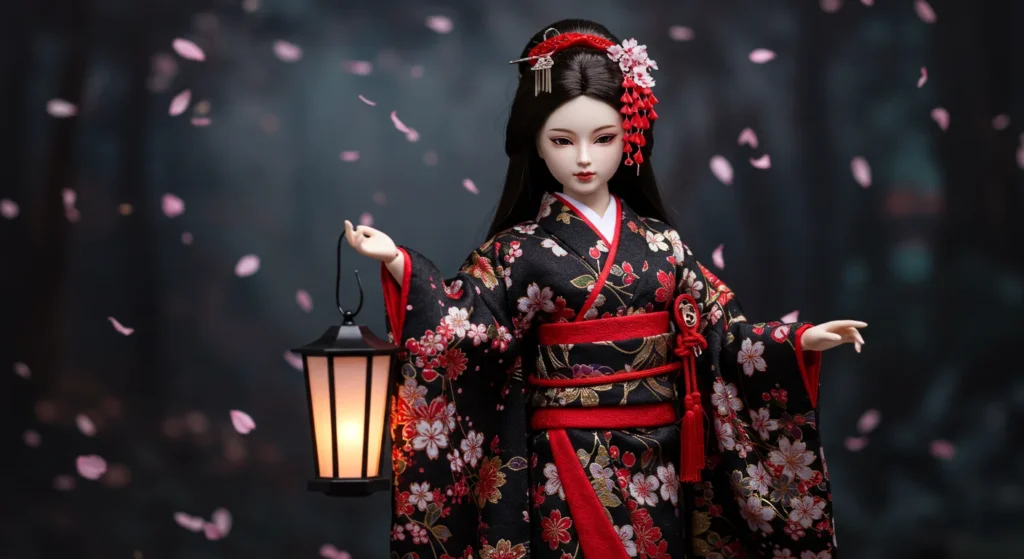
For feminine names with a touch of the morbid yet beautiful:
- Satsuki (殺気): Meaning a murderous aura or intent.
- Shiori (死織): Weaving death into meaning.
- Reiko (霊子): Spirit or ghost child.
- Yami (闇): Darkness, often associated with death.
- Sadako (貞子): Tied to folklore and spirits.
- Shiho (死帆) – “Death sail,” symbolizing the journey of the soul.
- Shika (死花) – “Death flower,” representing fleeting beauty.
- Shizuka (静香) – “Silent fragrance,” symbolizing the peace of death.
- Kuroha (黒羽) – “Black feather,” associated with crows and omens of death.
- Yoruha (夜刃) – “Night blade,” linked to darkness and silent death.
- Kagome (籠目) – “Caged eye,” often used in ghostly folklore.
- Mei (冥) – “Darkness” or “underworld,” referring to the spirit world.
- Kurami (暗実) – “Dark truth,” representing the reality of death.
- Yami (闇) – “Darkness,” symbolizing the unknown beyond death.
- Reika (霊華) – “Spirit flower,” associated with the souls of the dead.
- Rin’ne (輪廻) – “Reincarnation,” tied to the cycle of life and death.
- Sango (珊瑚) – “Coral,” sometimes associated with funeral rituals in Japan.
- Mikazuki (三日月) – “Crescent moon,” representing death and rebirth.
- Shion (紫苑) – “Aster flower,” a symbol of remembrance for the dead.
- Hakumei (薄命) – “Short life,” representing fleeting existence.
- Shinku (真紅) – “Deep crimson,” the color of blood and death.
- Hisame (氷雨) – “Cold rain,” symbolizing sorrow and mourning.
- Hotaru (蛍) – “Firefly,” believed to be the souls of the dead.
- Nozomi (望未) – “Unfulfilled hope,” representing a life cut short.
- Sakura (死桜) – “Death cherry blossom,” symbolizing fleeting life.
- Fuuka (風禍) – “Wind calamity,” representing sudden death.
- Himawari (日廻り) – “Turning sun,” signifying the cycle of life and death.
- Reiko (怜子) – “Ghost child,” a name often used in horror stories.
- Akumu (悪夢) – “Nightmare,” associated with fear and spirits.
- Tsukiyo (月夜) – “Moonlit night,” often linked to ghostly encounters.
- Yoru (夜) – “Night,” representing darkness and mystery.
- Mana (魔奈) – “Demonic grace,” linked to supernatural forces.
- Izumi (泉) – “Spring” or “fountain,” sometimes referring to the afterlife’s waters.
- Chisai (小宵) – “Little evening,” symbolizing the transition to the afterlife.
- Kokoro (虚心) – “Empty heart,” symbolizing emotional emptiness and loss.
- Hikari (光陰) – “Light and shadow,” representing life and death.
- Kanashi (哀し) – “Sorrow,” expressing grief and loss.
- Urei (憂憂) – “Mourning,” symbolizing grief for the departed.
- Mizuki (水葬) – “Water burial,” associated with ancient funeral rites.
- Setsuna (刹那) – “A brief moment,” symbolizing the fleeting nature of life.
- Mai (舞幽) – “Dancing ghost,” referring to spirits in Japanese folklore.
- Enma (閻魔) – The name of the ruler of the underworld.
- Higan (彼岸) – “The other shore,” referring to the Buddhist afterlife.
- Komori (蝙蝠) – “Bat,” a creature linked to spirits and darkness.
- Nyx (闇夜) – “Dark night,” symbolizing death and the unknown.
You May Also Like: 1000+ Roblox Usernames for Boys, Girls, Funny, and Unique
Japanese Names That Mean Death (Boys)
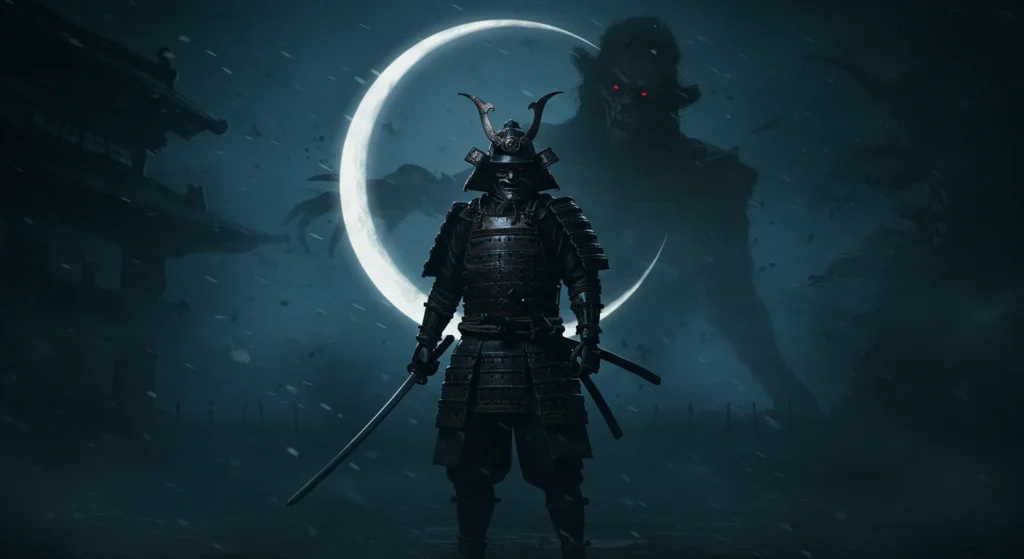
Looking for male names with deathly themes? Check these out:
- Shinobu (忍): Endurance, but also ties to quiet mourning.
- Takashi (孝死): Devotion to death.
- Masaki (真咲): Means blooming in truth but has a melancholic undertone.
- Riku (陸): Ground, often tied to burial.
- Kuro (黒): Black, a symbol of mourning and death.
- Shin (死ん) – “Death,” derived from the kanji for death (死).
- Shigeru (死玄) – “Mysterious death,” symbolizing the unknown.
- Kuro (黒) – “Black,” representing darkness and mourning.
- Kage (影) – “Shadow,” symbolizing spirits and the afterlife.
- Yoru (夜) – “Night,” associated with death and mystery.
- Kurou (苦労) – “Hardship,” often linked to suffering and loss.
- Reiji (霊司) – “Spirit ruler,” referring to control over the afterlife.
- Enma (閻魔) – The king of the underworld in Japanese mythology.
- Shimei (死命) – “Fate of death,” symbolizing an inescapable end.
- Rinne (輪廻) – “Reincarnation,” representing the cycle of death and rebirth.
- Meifu (冥府) – “Underworld,” the realm of the dead.
- Gurei (グレイ) – “Gray,” symbolizing the space between life and death.
- Souta (葬多) – “Many burials,” representing mass death.
- Doku (毒) – “Poison,” associated with deadly consequences.
- Shien (死炎) – “Death flames,” symbolizing the fires of the afterlife.
- Tenma (天魔) – “Heavenly demon,” associated with dark spirits.
- Kyoufu (恐怖) – “Fear,” linked to death’s ominous presence.
- Shiso (死相) – “Signs of death,” referring to omens.
- Raito (雷闘) – “Thunder battle,” often linked to death in war.
- Jigoku (地獄) – “Hell,” the realm of suffering and punishment.
- Kurogane (黒鋼) – “Black steel,” symbolizing strength in darkness.
- Akuma (悪魔) – “Demon,” a supernatural entity associated with death.
- Tomoe (友霊) – “Spirit friend,” referring to ghostly companionship.
- Baku (獏) – “Dream eater,” consuming nightmares related to death.
- Haka (墓) – “Grave,” symbolizing burial and final rest.
- Shoushi (消死) – “Fading death,” representing a slow demise.
- Kyomu (虚無) – “Nothingness,” symbolizing the void after death.
- Kurai (暗い) – “Dark,” representing gloom and despair.
- Shikyo (死境) – “Near death,” referring to a dangerous threshold.
- Gisei (犠牲) – “Sacrifice,” meaning a life lost for another.
- Mamoru (守霊) – “Spirit guardian,” one who protects the souls of the dead.
- Noroi (呪い) – “Curse,” often linked to vengeful spirits.
- Mugen (無限) – “Infinity,” referring to eternal rest or death.
- Kanashimi (悲しみ) – “Sadness,” associated with grief and loss.
- Sanzu (三途) – Refers to “Sanzu no Kawa,” the river separating life and death.
- Kaien (灰炎) – “Ash flames,” symbolizing destruction and rebirth.
- Hakaishi (墓石) – “Tombstone,” a direct reference to graves and burial sites.
- Reikon (霊魂) – “Soul” or “spirit,” referring to the departed.
- Yamiyo (闇夜) – “Dark night,” symbolizing an eternal sleep.
- Kuragari (暗がり) – “Deep darkness,” representing the unknown beyond life.
You May Also Like: 1000+ PS5 Usernames for Boys, Girls, Unique, and More
Japanese Names That Mean Death Angel
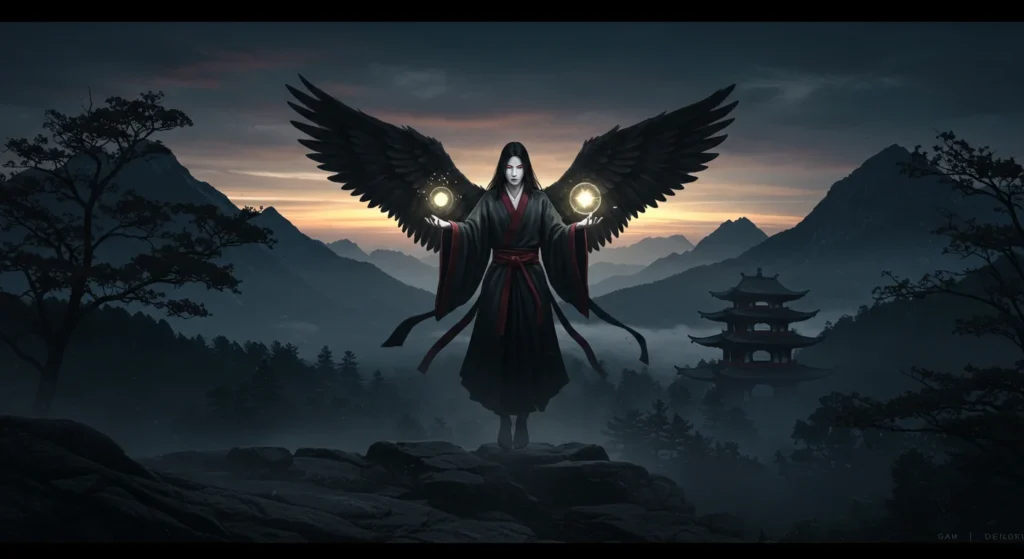
If you’re looking for angelic names with a deathly twist, here are some ideas:
- Tenshi (天使): Angel, but paired with kanji for death can mean a death angel.
- Akuma (悪魔): Demon, sometimes seen as a fallen angel of death.
- Mikazuki (三日月): Crescent moon, tied to spirits and ethereal beauty.
- Hikari (光死): Light of death.
- Seirei (精霊): Spirit, can mean a soul between worlds.
- Shinigami (死神) – “Death god,” a supernatural entity that guides souls to the afterlife.
- Tenshi (天使) – “Angel,” a celestial being, sometimes linked to both life and death.
- Shienshi (死天使) – “Death angel,” a combination of death (死) and angel (天使).
- Meitenshi (冥天使) – “Underworld angel,” representing a guide to the afterlife.
- Hakanashi (儚し) – “Ephemeral angel,” symbolizing fleeting existence and mortality.
- Yamishi (闇死) – “Dark death,” referring to a shadowy angel of death.
- Fushitenshi (不死天使) – “Immortal angel,” an angelic being tied to eternal souls.
- Kagetenshi (影天使) – “Shadow angel,” representing unseen spirits of death.
- Tsumikenshi (罪剣死) – “Sin blade death,” associated with divine punishment.
- Seishi (聖死) – “Sacred death,” symbolizing a holy reaper.
- Kurotenshi (黒天使) – “Black angel,” a fallen or dark angel of death.
- Shiryou (死霊) – “Death spirit,” referring to an ethereal reaper.
- Engetsu (冥月) – “Dark moon,” representing a celestial death bringer.
- Norotenshi (呪天使) – “Cursed angel,” one bound to darkness.
- Kurayami (暗闇) – “Deep darkness,” symbolizing an angel in the void.
- Reikoku (冷酷) – “Heartless,” referring to an emotionless death angel.
- Satsutenshi (殺天使) – “Killing angel,” representing divine retribution.
- Meikoku (冥国) – “Underworld country,” an angel serving the dead.
- Shousetsu (消雪) – “Vanishing snow,” symbolizing silent death.
- Genshirou (幻死郎) – “Phantom death son,” referring to a male reaper.
- Akatsuki (暁闇) – “Dawn darkness,” an angel appearing at death’s door.
- Shion (死音) – “Death sound,” symbolizing a whispering reaper.
- Tsubame (燕死) – “Swallow of death,” a bird associated with souls.
- Hoshitenshi (星天使) – “Star angel,” guiding spirits to the afterlife.
- Naitenshi (泣天使) – “Weeping angel,” mourning lost souls.
- Shizukenshi (静剣死) – “Silent sword death,” a merciful reaper.
- Mugetsu (無月) – “Moonless night,” referring to an unseen angel.
- Kasumi (霞死) – “Death mist,” symbolizing an angel hidden in fog.
- Soutenshi (蒼天使) – “Pale angel,” representing a ghostly presence.
- Urami (恨み) – “Grudge,” an avenging angel of death.
- Yamitsuki (闇月) – “Dark moon,” linked to celestial death spirits.
- Mugenrei (無限霊) – “Eternal soul,” referring to a timeless angel.
- Shingetsu (新月死) – “New moon death,” symbolizing a cycle of souls.
- Yureitenshi (幽霊天使) – “Ghost angel,” a spirit delivering death.
- Onitenshi (鬼天使) – “Demon angel,” referring to a wrathful reaper.
- Kourin (降臨死) – “Descending death,” a divine angel of the end.
- Meifu no Tenshi (冥府の天使) – “Angel of the underworld,” guiding souls.
- Shinseikenshi (神聖剣死) – “Holy sword death,” a warrior angel of fate.
- Shikkoku Tenshi (漆黒天使) – “Jet-black angel,” a dark harbinger of doom.
- Reika Tenshi (霊華天使) – “Spirit flower angel,” a gentle guide to the afterlife.
You May Also Like: 1000+ Hard Usernames for Instagram, TikTok, Roblox & More
Names Associated with Darkness and Shadows
Names that evoke imagery of shadows and darkness, connected to death:
- Kurai (暗い): Gloom or darkness.
- Yoru (夜): Night, symbolizing the end.
- Kokuei (黒影): Black shadow.
- An’ya (暗夜): Dark night.
- Kageyama (影山): Shadowed mountain.
Unique Japanese Names Symbolizing Mourning
Names that subtly reference mourning:
- Kanashimi (悲しみ): Sadness or grief.
- Namida (涙): Tears, often shed for the departed.
- Tsukiyo (月夜): Moonlit night, a serene moment of reflection.
- Hakanai (儚い): Transient or fleeting, tied to mortality.
- Shin’en (深淵): Abyss, symbolizing a deep loss.
Nature-Inspired Names Related to Death
Nature often reflects the cycle of life and death.
- Kurohana (黒花): Black flower, symbolizing mourning.
- Shizuka (静か): Serenity, often felt in death.
- Fuyu (冬): Winter, representing the end of a cycle.
- Yukiko (雪子): Snow child, pure but fleeting.
- Kiri (霧): Mist, representing mystery and otherworldliness.
Spiritual and Religious Names Associated with Death
Names tied to spiritual themes and beliefs:
- Jizo (地蔵): A guardian spirit of the dead.
- Bodai (菩提): Enlightenment or the afterlife.
- Rinne (輪廻): Reincarnation or the cycle of death and rebirth.
- Hotoke (仏): Buddha or deceased spirit.
- Shinto (神道): Connection to kami (spirits).
Anime-Inspired Death-Themed Names
Popular anime often feature characters with death-related names:
- Ryuk (リューク): From Death Note, a shinigami.
- Misa (ミサ): A character tied to death.
- Zeref (ゼレフ): From Fairy Tail, a dark mage.
- Akame (アカメ): Known for her deadly skills.
- Kaname (要): Often tied to pivotal or life-ending moments.
Unisex Japanese Names Related to Death
These names work for any gender:
- Haku (白): White, symbolizing death in some cultures.
- Rin (凛): Cold, often tied to winter and endings.
- Sora (空): Sky, representing the soul’s journey.
- Kai (海): Ocean, vast and mysterious like death.
- Shou (翔): To soar, often linked to freedom after death.
- Kurai (暗い) – “Dark” or “gloomy,” symbolizing mystery and secrecy.
- Kage (影) – “Shadow,” representing the unseen and hidden aspects of life.
- Yami (闇) – “Darkness,” associated with the unknown and fear.
- Ankoku (暗黒) – “Deep darkness” or “pitch black.”
- Mikage (御影) – “Sacred shadow,” referring to a divine presence hidden in darkness.
- Kuragari (暗がり) – “Dim place,” representing hidden depths and secrecy.
- Higure (日暮れ) – “Sunset,” the transition into darkness.
- Tokoyami (常闇) – “Everlasting darkness,” symbolizing eternal night.
- Meian (明暗) – “Light and dark,” representing balance and contrast.
- Genmu (幻霧) – “Illusory mist,” symbolizing a mysterious, foggy presence.
Modern Uses of Japanese Death Names
Japanese names with death themes are used for various purposes today, such as:
- Naming characters in novels or anime.
- Selecting unique baby names with deep meanings.
- Choosing nicknames for online gaming or social media.
- Naming pets or fictional creatures.
How to Choose the Perfect Japanese Name?
When picking a name:
- Understand the Meaning: Ensure the name aligns with the intended symbolism.
- Consider the Context: Is it for a character, pet, or something else?
- Respect Cultural Significance: Some names carry deep cultural or spiritual weight.
Conclusion
Japanese names that mean death or are tied to its themes are rich with history, culture, and symbolism.
If you’re looking for something mysterious, poetic, or powerful, this list provides endless inspiration.
Dive into the beauty of Japanese naming traditions and find the perfect name that resonates with you.
FAQs
1. What is the Japanese name for the god of death?
Shinigami (死神) represents the god or spirit of death in Japanese culture.
2. Are Japanese death-related names common?
Not typically for real-life use, but they are popular in anime, literature, and gaming.
3. Can these names be used for pets or gaming handles?
Absolutely! They’re unique and carry intriguing meanings.
4. Are these names respectful to Japanese culture?
Yes, as long as they’re used with an understanding of their significance and not inappropriately.
5. Which name is best for a female character in a story?
Reiko (霊子) or Sadako (貞子) are great options for a mysterious, death-themed female character.

I’m the creator of PickGoodName, where I dive into the world of unique and creative name ideas for online platforms, games, pets, and more. Naming things is my passion, and I love helping people find the perfect name that stands out. If you’re looking for something cool, funny, or meaningful So you can explore my amazing articles with unique ideas!
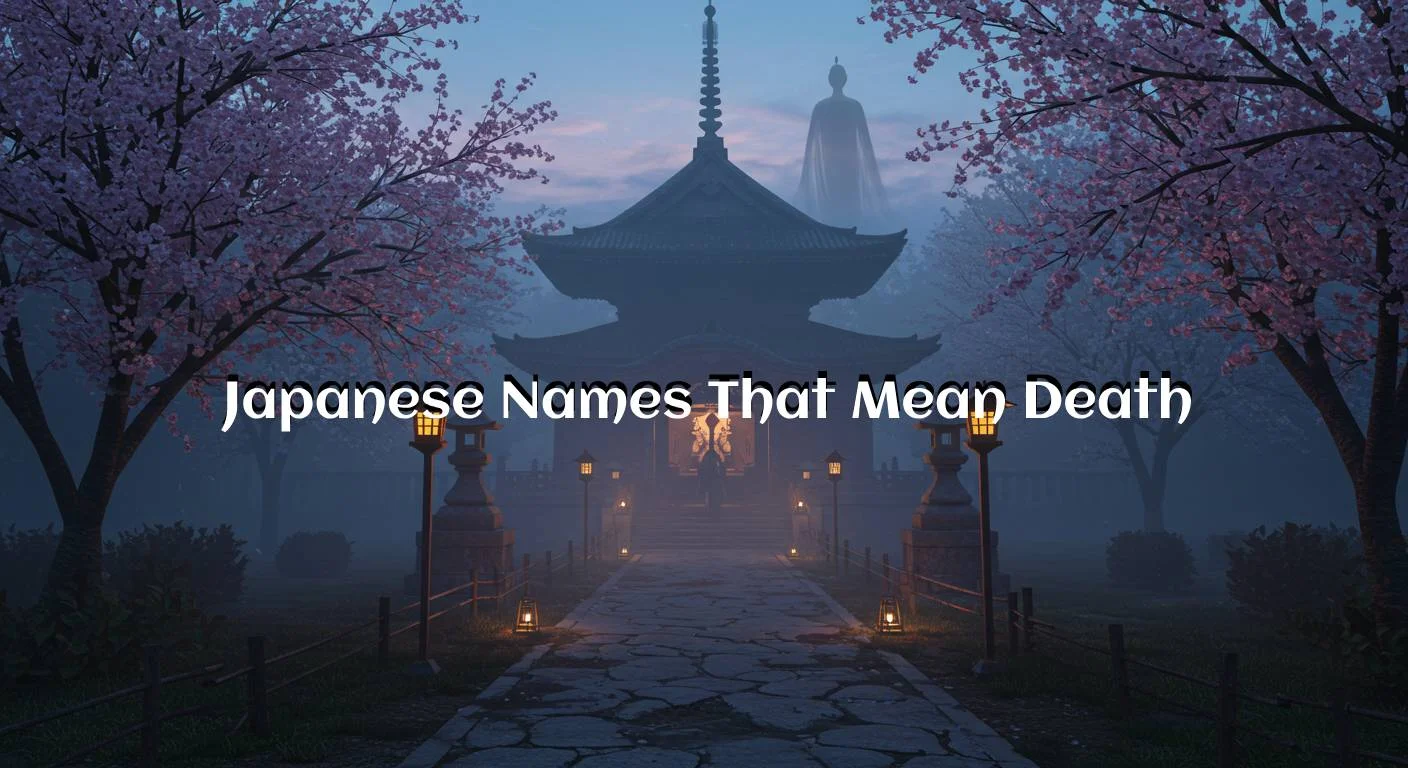
3 thoughts on “1000+ Japanese Names That Mean Death”